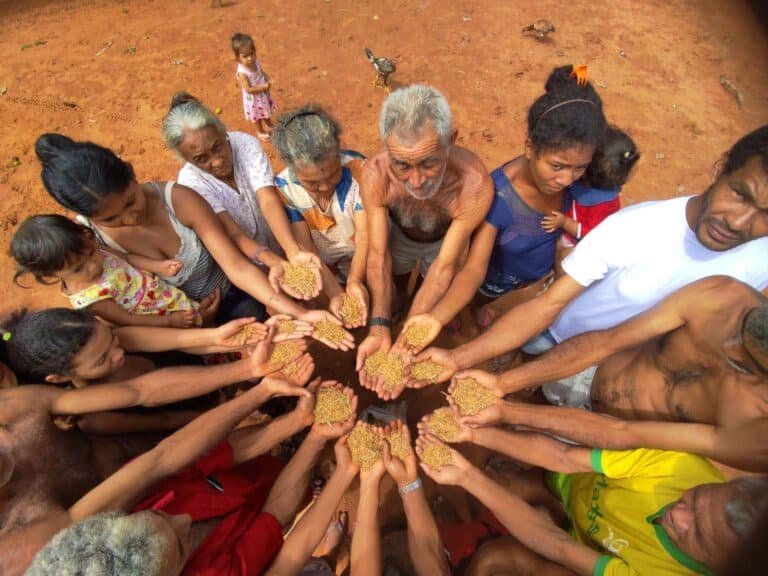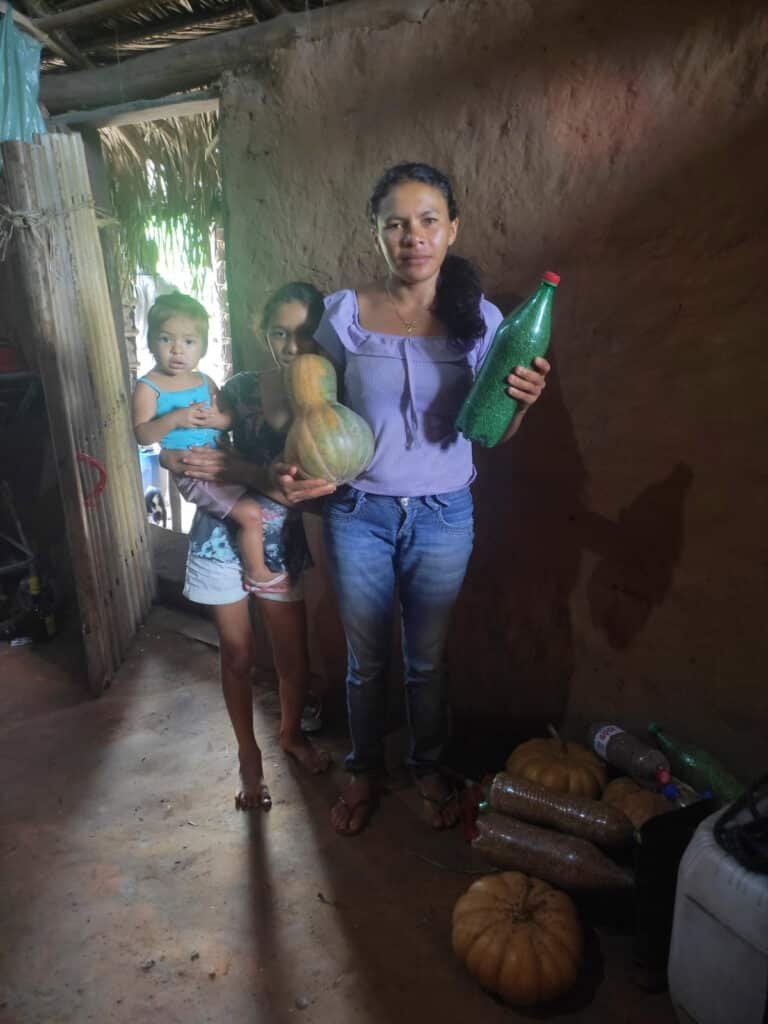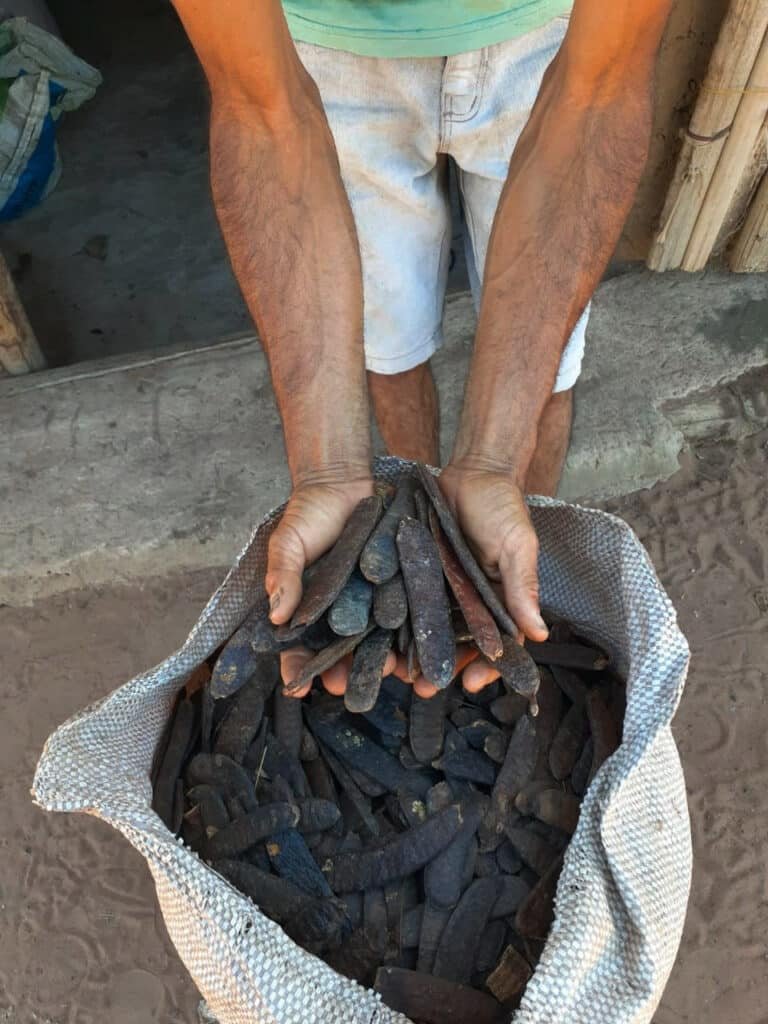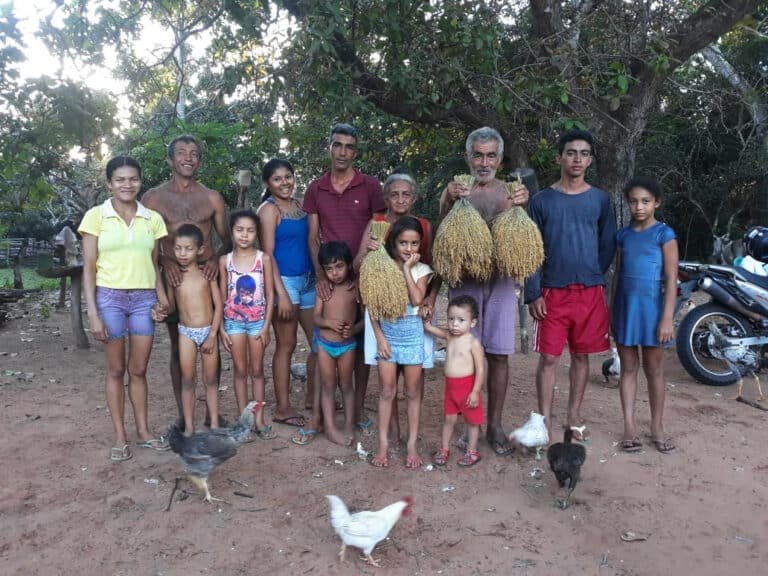Amazônia-Cerrado
MARANHÃO
The Boa Esperança (Good Hope) territory is located in the municipality of Formosa da Serra Negra, Maranhão state[1], 481 km from the capital São Luís. It lies in a transition area between the Cerrado and the Legal Amazon, in the southern part of the state, between the municipalities of Alto Mearim and Grajaú.
The footsteps that defined this territory came from afar. Most of this traditional Sertaneja (Backlands) community’s first settlers had fled from droughts in Piauí and Ceará states in the 1930s: two families headed by Ludogério and Mr. Gonzaga. But only in 1950, with the arrival of Lourenço, father of Mr. Joaquim Gomes, those travelers, worn down by the lack of water, land, and food, found in that piece of land a reason to look for hope. Hope to be able to stay in a new home, hope in the common use of the land, the water, and the forest, with all the symbolic dimensions that Dona Anália Barros remembers:
The story told by Anália Barros explains why they adopted the name Boa Esperança around 1950. Being close to the Corda River[2], the territory has been enjoying abundant water, which is fundamental for human survival, for their crops, and also for the fields where they raise their livestock.
The community is located within an area of 9,524 hectares, but the families only claim 3,225 hectares, which they recognize as their common use area. According to Mr. Joaquim Gomes, people who claim to be “landowners” covet this area because it is well suited for cattle ranching and planting soy, rice, and eucalyptus. Today, the territory is under the protection of eight families, the sons and daughters of the first settlers, along with relatives who returned to the community after migrating in search of work.
Notes
Source: IBGE | Cidades@ | Maranhão | Formosa da Serra Negra | História & Fotos. Dated April 22, 2022.
The Corda River is a Brazilian river that flows through the state of Maranhão. Formerly, it was known as Rio Capim, but with all the vines coiled there in the form of a rope (corda, in Portuguese), it gained the name Rio Corda. With a 4700 km² watershed, its source is in the Canela mountain range, at about 450 m altitude, currently located inside a large farm named Agroserra in Balsas, near the city of Fortaleza dos Nogueiras. Its main tributaries are the Pau Grosso and the Ourives rivers and smaller streams such as the Pintado, Estiva, Fundo, Baixão do Sabonete and Baixão Lagoa de Dentro. With its clear and fast-running waters, it flows approximately 240 km into the Mearim River in the municipality of Barra do Corda. Available here.
The process of land grabbing
Over six decades, according to Raniere Roseira, agent of the Maranhão Regional Pastoral Land Commission, “the territory’s chain of ownership records show no exact timing for the land’s titling, with the families already in place”.
The only official documents dated 2015[3]. There is a real estate registration document filed at the 1st extrajudicial records office in Grajaú/MA[4], for the land’s sale by José Rodrigues to Celso Antonio Lambais, from the city of São Caetano do Sul in São Paulo, on December 22, 2015, for the amount of R$ 1,765,820.00. Twenty-two days later, according to the same notary real estate document, the same Celso Antonio Lambais incorporated the property as an asset of the GenesisAgro S/A company[5], with the justification of increasing the company’s capital stock.
From that year on, the conflicts intensified. The community recalls the arrival of a court official, Mr. Deodato Coelho de Sousa[6], in June 2015, and a land-grabbing broker known as Luís do Gerson, who was in the community in March 2015, offering money for the families to leave the community. On June 26, 2015, a criminal complaint against the residents and, in 2016, a repossession suit[7] were both filed by José Rodrigues (now deceased) and his daughter Maria José Coelho Rodrigues.
The manager arrived with the court official, threatening us and saying that he was bringing new residents to live in the houses. When the court official came in, he threatened my old mother, 80-something years old at the time, now deceased, saying: “I’m the one to give you due notice and I’m the one to kick you out too, but with a bone-tipped whip[8], get it?’ Making that kind of threats.
In addition, according to reports from the residents, there have been attempts at co-optation, threats, complaints to the civil police station in the municipality of Formosa de Serra Negra and the District Attorney’s Office in Grajaú, as well as offenses and intimidation.
The threats are hurting the families and the maintenance of the wealth of the land, especially its productive soil, the native forest, and the water, since the community is bathed by the Corda River. The agrarian dispute afflicting these families arose precisely because of that natural wealth, and the fact that the territory is well located, close to the BR 226 highway, thus facilitating the flow of the produce. In addition, the municipality itself has weak environmental enforcement policies that do not ensure the protection of natural resources.
Notes
Taxpayer ID number (CNPJ) 18.604.440/0001-13, founded in São Paulo in 2013.
José de Queiroz Carvalho’s story highlights the importance not only of safeguarding ways of life, but also of maintaining the space for the cultural, social, and economic reproduction of those who define themselves as traditional communities. This right is protected by federal Decree No. 6040 of February 7, 2007[9], which established the National Policy for Sustainable Development of Traditional Peoples and Communities, to promote “the strengthening and guaranteeing of territorial, social, environmental, economic, and cultural rights of traditional peoples and communities”[10]. It also recognizes the right to remain on the land, which the families in the Boa Esperança territory have asserted through their internal processes of organizing and protecting the waters, the land, the animals, and their families.
Difficulties filing police reports heighten insecurity
Since 2015, the community has been living in a state of alarm, but it is facing its opponents. The fact is that, so far, the community has only managed to file one Police Report (B.O. 003/2016) dated January 12, 2016, at the Civil Police Station of the Municipality of Formosa da Serra Negra (MA). In it, José de Queiroz Carvalho, son of Mr. Joaquim Gomes, denounced threats against the community with the physical presence of four men, among them two managers of the Boa Esperança Farm, codenames Antonio Arruda and André, who intimidated the families to stop planting their crops and announcing that they would be evicted from the land for the arrival of other residents, who would be hired to work as farmhands.
The other incidents could not be denounced, although the community tried to file police reports. In these cases, the police officers at the Formosa de Serra Negra police station would claim they had some kind of problem, like a computer failure at the police station, or they were out of paper, or the police chief was out of town.
On the other hand, the residents suffer with unfounded complaints filed in police reports by the alleged owners, such as those made by Maria José Coelho Rodrigues, alleging that Mr. Joaquim Gomes, from the Boa Esperança community, was threatening her. In the first one, dated March 18, 2015, she said a motorcycle driver had threatened to kill her. In the second, on May 25, 2015, she said a note was left on her doorstep with a package containing 19 pellets of lead, some gunpowder and four 32-guage shells. According to her, the note said: “To Bizeca, Joaquim”.
For the community, false accusations filed at the police station in the municipality of Grajaú are intended to criminalize the families’ struggle in the territory and, consequently, threaten the lives of the people living there.
Boa Esperança resists in a region marked by conflicts
With all these difficulties in making themselves heard, the community decided to take a different approach. After a meeting in their territory, they decided to make a list of all the times they had been threatened and intimidated. The residents started to make their own records, with photographs and reports about the incidents, which were sent to be filed by the agents and legal staff of the Pastoral Land Commission (CPT).
In an attempt to work more collectively, in 2018 the community started to network with other territories in the region[11] that suffer similar violence: death threats and expulsion from the territories, criminal fires, and failure of the State to ensure the safety of families and guarantee their rights to the land. The communities have met with the State Public Defender’s Office, in an attempt to confront the state in court, since municipal authorities do not give the families the necessary attention when they try to file complaints.
Notas
The Boa Esperança community is part of this broader context of conflicts in the region, where squatters have been the main targets of attacks. According to data from the Dom Tomás Balduíno Documentation Center (Cedoc/CPT), there were 49 conflicts in the municipality of Formosa da Serra Negra alone between 2011 and 2021[12]. 60% of land conflicts were caused by land grabbers and, in 81% of the cases, it was squatters who suffered violence. Most of these land conflicts, 63% of them, took place in the last three years (2019 to 2021).
Notes
Also according to CPT data, in the Formosa da Serra Negra region, a total of 84 land conflicts occurred between 2011 and 2021. The main culprits were also land grabbers, in 45% of the cases, followed by ranchers, who caused 25% of the conflicts. Squatters were the targets of 64% of the violence. There were also six labor conflicts, eight conflicts over water, one camp, and one occupation, totaling 100 rural conflicts in this region alone in this same period.
Community fire prevention actions in the territory
From 2015 to 2017, the families endured frequent cases of fires invading their territory in areas of pasture, native forests, and farmland. The fires keep the families on constant alert to stop them from spreading to their homes, fields, springs, and native forests inside their territory.
Notes
Jornal Pequeno. Incêndio coloca em risco território quilombola no município de Parnarama no Maranhão [Fire outbreak puts quilombola territory at risk in the municipality of Parnarama, Maranhão state]. September 2020.
According to the families, in the community there is no deforestation to extract timber, not even by outsiders. The families’ commons are their collective system for fishing, planting, hunting, extraction of natural resources, honey production, etc. This maintains greater physical control of their territory and ensures a certain autonomy.
The community uses local knowledge, giving a transcendent meaning to the land, as well as internal political organizational factors to protect the territory. Its ecological awareness is expressed in the rules, norms, or agreements that provide the basis for a work plan to carry out this caretaking relationship with the land and territory.
Collective organization lets hope prevail
The families drew up self-protection strategies within their territory at internal meetings held whenever needed or when there was any kind of threat, whether the danger of fire, the arrival of outsiders, or even to discuss how to distribute family households inside the territory, to locate and build houses making the best use of the land. They also deliberate on building fences to keep out land grabbers, organizing brigades to monitor the territory, opening firebreaks along the river, and self-demarcating the location of fields, pastures, and reserves.
Realizing the importance of self-organization was crucial for the families in the territory to formulate their demands and work with partners to find ways to survive and remain on the land.
Access to electric power only came in December 2021 – with the arrival of three diesel engines – an important milestone for the families. It had been a long-standing demand to overcome difficulties such as access to cell phone communication (since they are 80 km away from Formosa de Serra Negra), cold storage of certain medicines for the elderly or for newborn children, and also to conserve food, such as fruits and vegetables.
Electricity also brought new forms of hope, for families to dream of other possibilities, such as processing cassava flour, buying a rice mill, and consuming and selling the pulp of native fruits that used to be wasted – souari, bacuri (Platonia), jackfruit, turu palm, etc[13]. The importance of a new power source goes beyond those possibilities and allows people to integrate their work with keeping traditions and respect for diversity in their own territory, while living a good life.
Men, women, young people, and the elderly have also started the construction of a warehouse to save and store their heirloom varieties of seeds for cowpeas, pigeon peas, lima beans, evergreen beans, long-grain rice, common rice, red rice, “old skirt” rice, large-grain maize, fava beans, cassava, white sesame and black sesame, squash, gourds, okra, maroon cucumbers, etc.
That diversity being conserved is a sure way to keep enough quantity and quality in the field and for future generations, as well as to maintain the knowledge of their ancestors in the process of conservation and care. This has made the Boa Esperança territory a benchmark for the region, with seed exchanges taking place wherever the community can be present, such as in the gatherings of the Teia dos Povos (People’s Web), which brings together many communities who also provide seeds of other varieties of corn, sesame, squash, potatoes, yuca, beans, and rice.
Now, Boa Esperança is preparing to take further steps on its path to protecting what the families believe is important to perpetuate for future generations. As the community continues to ponder and seek collective solutions, the first workshops have been held to develop the territory’s community protocol, as a political instrument for internal organization, based on agreements governed by the families’ own ways of doing, creating, and living, recognizing themselves as belonging to the territory, strengthening their self-defense, ancestral knowledge, and collective resistance.
The families in this territory have faith, courage, and the presence of CPT as reasons to face their fears and achieve their hope of building and expanding different ways to produce, sell, and communicate. Without turning their backs, but uplifting their origins based on traditional knowledge guided by and linked into their natural resources, growing and spreading their roots in all the women, men, youth, elderly, and children who make this a sacred space.
Notes
Linalva Cunha Cardoso Silva is a volunteer agent for the Maranhão Regional Land Pastoral Commission (CPT), with an undergraduate degree in History and a Master’s in Social and Political Cartography of the Amazon.











